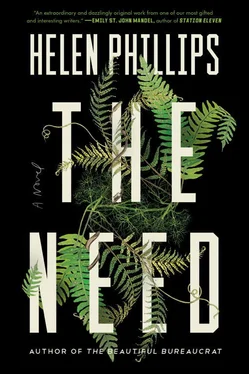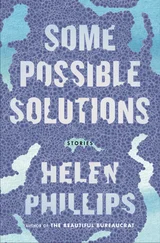“I knew you weren’t paying attention.”
She said nothing. She focused on the grapes. He waited.
“My flight leaves at two this afternoon,” he said.
“Okay,” she said, grateful for the noncommittal word.
“They’re paying double because of the change.”
“Okay.” She didn’t want to tell him anything that would unsettle this reality, this well-known reality of them together in the kitchen, soon to be interrupted by the ones they loved above all else.
“I can walk Viv to school and be with Ben till I have to go. I’ll text Erika.”
“Okay.”
He reached around her and turned off the faucet. He said her name twice. He held her. It was good to be held by him. She rested, briefly, against him. It had always been rich between them, it had been hard at times and they had had their times of anger, but it had always been rich and true, and she did not know how to talk to him when she was not being true, when she could not speak truly.
“Daddy?” A quartet of sticky feet coming down the hall. “Daddy?”
Corey was looking at her funny, and she realized he had asked her the same question multiple times.
And then the question registered, then it hit her: “Did you go home to shower?”
She responded with a head gesture that could be read either way.
“I saw you out there when I got here,” he said. “Car in the shop? Went to the Pit to say hi after putting coffee on but you were gone.”
“You saw me? What was I wearing?”
“I don’t know, Molly. Pants and a shirt! Find anything?”
“What was I doing?”
“I don’t know. What were you doing?”
“What do you think I was doing?”
“A little early-morning precrowd excavation—right? Because you heard that Roz found another Fifi Flower specimen yesterday and you want to find one too?”
“But where was I exactly?” Molly persisted, barely hearing him.
“Molly.”
“You could see me. So I wasn’t in the Pit. I was near the Pit. But do you think I was going down or coming up?”
“Molly!” Corey laughed. “Seriously, though, we’re waiting on you. The Bible?”
“I feel like shit,” she said. The words fell so far short of the feeling.
“Yeah you’ve been kind of a mess this week. Why don’t you leave the Bible and friends with me and go home, rest up.”
“Okay,” Molly said, inching toward the doorway, past Corey, “I—”
And she exited her cubicle, and hurried down the hallway, and out the glass door, ignoring Corey’s voice repeating her name.
She wanted to run straight to her car, but she knew that first she had to force herself to go and look into the Pit.
This was the only reason she had come to work: to search for Moll.
What she saw when she envisioned the Pit was Moll, facedown, star-shaped in the mud.
She began the thirty-yard journey hesitantly, dreading the downward glance, the potential corpse, but by the end she was sprinting to reach the edge of the Pit.
As Molly pulled out of the parking lot—already filling up with vehicles in anticipation of the morning tour—she waved to Corey, who must have had his eye on her from the doorway. She saw him in her rearview mirror, standing in the open door, saying something in her direction. He was suspicious, so suspicious and so kind. She turned the proper direction out of the parking lot to make him believe that she was going home to rest up and return to herself.
Roz was arriving in her truck just as Molly was leaving in her car. Roz eyed her, let go of the steering wheel to gesture an aggressive question with her hands and elbows, and though Molly was vaguely moved by Roz’s understandable exasperation, she just waved and accelerated.
The Pit had looked like a pit, nothing more, no portal, no seam, no body, no locus of cosmic arrivals and departures: just mud and puddles. The soft rubble of dirt moistened and dried and moistened and dried and moistened again. There were footprints encircling the Pit, footprints leading down into it. She knelt to examine them. They matched the soles of the sneakers on her feet. She had lost her balance for an instant, had felt herself sliding down the side, laden with small bodies.
She passed through an intersection, another intersection, another intersection.
Only then did Corey’s question strike her: Car in the shop? Meaning—what? That he had seen in the parking lot, when he saw Moll at the Pit, some unknown car?
So where was Moll?
Could Molly imagine her way through the blast, the loss, the seam, the grief, the rage, the plan, the days, the sex, the flight, in order to determine the location of her other? The person who was perhaps in hiding, plotting her next and darkest step. The person who was perhaps in dire need of help and comfort, food and shelter.
Where would she herself go under those circumstances?
What would she herself be capable of?
But she did not know herself well enough to answer the first question, and she did not dare to answer the second.
She drove around, speculating. She drove to the reservoir. The wind blowing, the sky colorless. It alarmed her how little it bothered her, the fact of Moll and David’s sex. How natural, almost obvious, it seemed: David had slept with his wife, Moll had slept with her husband.
When her milk came down, she thought of Moll’s coming down too. It was the first time her milk had come down today. Now that he was getting half his milk from Moll, her supply was diminishing.
She imagined saying to Moll, What happens if you’re trying to pump while also having any kind of disagreement, small or large, with David?
No milk , Moll would reply.
Weird, right?
Remember that first shit after giving birth? Moll would volley back.
Scary, right?
And with each exchange, Molly’s body would grow more excited, an inner flush spreading through her at the affirmation of their shared random memories, a shedding of all loneliness, a level of unity rapidly approaching the divine. She dreamed of asking Moll never-ending questions, dreamed of hearing Moll’s Yes. Yes. Yes.
She drove around, desperate. The urgency of her search was undeniable: she felt it in each part of her body, everything pounding, elevated, dizzy. But she could not tell whether it was the urgency of tracking down an enemy or the urgency of looking for a friend. She was terrified of Moll. She was worried about Moll.
There was a particular bench she liked. There was a particular café. Everywhere she went she felt as though Moll had just been there. Yet she couldn’t bring herself to ask anyone, “Excuse me, have you by chance seen a woman identical to me but wearing dirty sweatpants?”
She sat in the parked car in the uncomfortable heat, immobilized by the what-ifs, the swiftness with which anything can change, the ever-present split second that is the difference between blood spilling or not, the difference between one future and another. She contemplated equally the possibility that Moll had slipped away for all eternity and the possibility that Moll would reappear at any moment to kill her.
Where was she?
Molly was unlocking the door to Norma’s house when she remembered that Norma was back from her trip. She did not want to see Norma. She did not want to see anybody. Only one person. But here came Norma, through the kitchen with her walker.
“Forget something?” Norma said.
So Moll had indeed done the same: had gone to Norma’s, had unlocked the door before realizing the house was no longer uninhabited.
Molly stepped inside. The kitchen still buzzed from her first encounter with Moll. It was the same as ever: the tarnished copper kettle, the red-and-white-checkered fabric, the strawberry lamp. Yet now it buzzed with something, and would forevermore.
Читать дальше





![Unknown - [Carly Phillips] The Bachelor (The Chandler Brothe(Bookos.org) (1)](/books/174132/unknown-carly-phillips-the-bachelor-the-chandle-thumb.webp)






